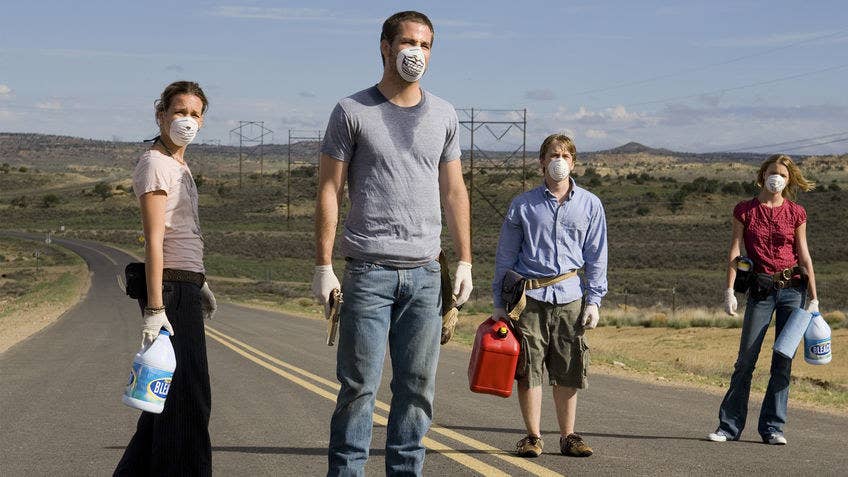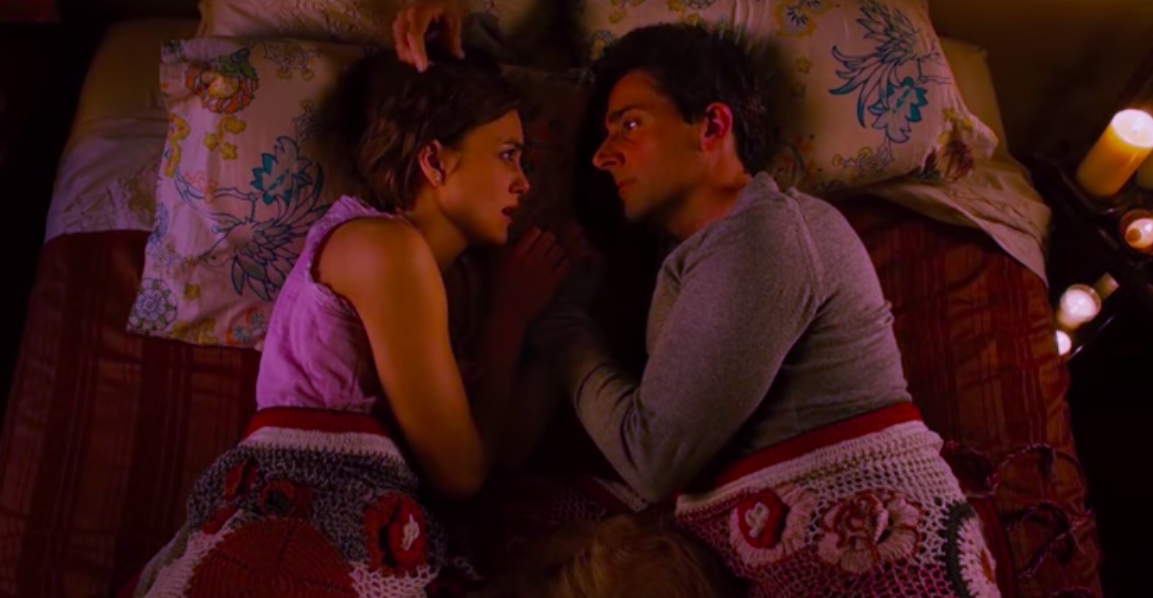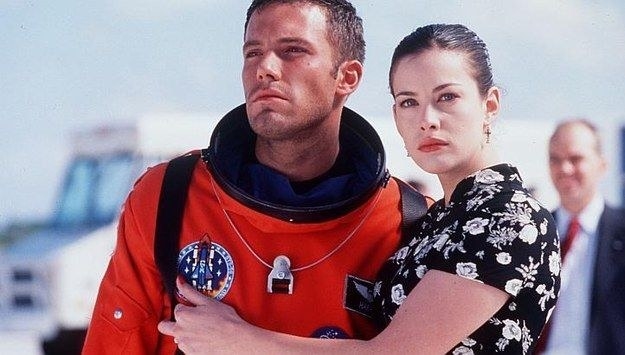
The journalists at BuzzFeed News are proud to bring you trustworthy and relevant reporting about the coronavirus. To help keep this news free, become a member and sign up for our newsletter, Outbreak Today.
I can’t stop watching movies about the world coming to an end.
Like seemingly everyone else in the country, I started with Contagion, which I watched for the first time at the end of February so that I could interview veterinary pathologist Tracey McNamara, who served as a scientific adviser for the film. At that point, COVID-19 was already silently spreading in the US, but hadn’t really started to make itself felt in earnest. But that conversation was sobering; McNamara told me that Steven Soderbergh’s 2011 film about a disease that originates in Hong Kong and rapidly spreads around the world, killing millions of people, was meant to be a warning. Evidently, it wasn’t one that fully got through.
My apocalyptic viewing started ramping up in earnest a couple of weeks ago, when the US made a collective shift toward taking the coronavirus more seriously. Things felt like they took a significant turn on March 11, when the spread of the virus prompted Trump to suspend travel from Europe to the US, Tom Hanks announced he and his wife, Rita Wilson, were quarantined with the virus in Australia, and the NBA postponed the rest of its season indefinitely. That same day, I was told by my company to start working from home and social distancing, and I witnessed firsthand the eeriness of going to a normally stocked grocery store that was left with barren freezers and empty shelves where canned goods and toilet paper were once abundant. It was a bizarre and unsettling moment. All of a sudden, things felt like they were changing, and they wouldn’t be getting better anytime soon.
This was before we knew what we know now; before the coronavirus infected more than 189,000 people in the United States, before states across the country instituted strict shelter-in-place mandates keeping residents inside their homes, before hospitals were overwhelmed, and before presidential adviser Dr. Anthony Fauci told the US to prepare for between 100,000 and 240,000 deaths in the next few months as a result of the virus. But even weeks ago, the fear of all of these forthcoming realities inspired me to double down and watch Contagion yet again; I had a morbid curiosity to see just how many apocalyptic movies I could stream from the comfort of my own apartment over the course of a single weekend.
After Contagion, I turned to Outbreak, which has also been experiencing a timely surge in popularity on Netflix. Set in 1995, Outbreak (loosely adapted from the nonfiction book The Hot Zone) is about the global spread of a lethal virus that causes people to break out into a terrible fever before killing them. It was horrifying to watch the eerie parallels of this disease infecting the masses, hospitals putting patients into quarantine, and the CDC scrambling to come up with a vaccine.
Things took a turn when I streamed How It All Ends, a random Netflix movie from 2018 starring Forest Whitaker and Theo James. Their characters drive from Chicago to Seattle in search of Whitaker’s daughter and James’s girlfriend after a mysterious seismic event happens on the West Coast, shutting down national flights and leaving people across the country in panic about the unknown disaster. Then I watched the 2009 film Carriers, about a couple of brothers and their girlfriends living in a postapocalyptic society after a mysterious virus has spread around the globe and killed the majority of the population. Neither of the two movies is critically acclaimed — nor are they popular or realistic! — but that didn’t stop them from being very unsettling and stressful to watch.
I rebounded with the Steve Carell and Keira Knightley romantic dramedy Seeking a Friend for the End of the World, from 2012, about two people finding love and friendship with only 21 days left to live before an asteroid crashes into the planet. Sure, the world does actually come to an end, but there's also something charming and hopeful about watching Carell and Knightley find closure and fall in love, holding one another close as an asteroid hits Earth at the one hour and 40 minute mark.
The last apocalyptic film I watched in my anxiety-inducing marathon was the 1997 classic Armageddon, which is basically a full-fledged feel-good movie compared to the rest. This movie truly has it all: nutty humor, an epic love story with a young, charismatic Ben Affleck and Liv Tyler, and the grumpy yet heroic Bruce Willis. Who doesn't want to feel a huge sense of relief as they watch a 25-year-old Affleck, fresh off Good Will Hunting, help save the world and give viewers a happy ending?

I’m certainly not the only person gravitating toward apocalyptic movies about surviving the end of the world and viruses spreading — Contagion is currently one of the 10 most-watched films on iTunes, and Outbreak has been on Netflix’s top 10 most-watched list for the past few weeks. But to be crystal clear: I do not recommend anyone else fall down the same kind of rabbit hole that I have.
In fact, I was concerned enough with my behavior that I checked in with a professional to see just how bad an idea my obsessive viewing actually was. I wanted to know: Is it copacetic to watch a string of apocalypse movies in the midst of what seems pretty close to an actual apocalypse? Or was I doing this at the serious cost of my own emotional well-being? I reached out to Christina Scott, a psychology professor at Whittier College, who's researched and spoken about "the allure of dystopia in popular culture."
“People are naturally going to turn to Netflix because of escapism,” Scott told me. “But everything is best in moderation. I realize what a cliché that sounds like, but I wouldn’t watch 45 romantic comedies and I wouldn’t watch 45 doomsday movies back to back.”
Scott explained that the reason people like me are gravitating toward such dark films, which mirror at least a semblance of what we’re seeing happen around us in real life, is because of something called the terror management theory.
“I think that’s comforting to people that in two hours or less, you're going to watch this mess get cleaned up. ‘Cause we can't get an ending right now.”
“The theory basically says that all of us are scared out of our minds that our lives are limited and we will die one day, and it's not something we like to think about,” Scott said. “So I think in a moment of a pandemic, people want to escape.”
Some people are finding escape and comfort in streaming content that allows them to dissociate from the current state of the world, like romantic comedies or movies that make us feel nostalgic. But for those of us who are slightly masochistic, turning to apocalyptic movies is another means of comfort, according to Scott.
“There are two reasons I personally would think we would be looking at movies like Contagion right now. One of them is that it almost gives us a sense that reality isn’t that bad. It could be a lot worse, because look what a disaster is going on in this particular movie,” she said. “And I think the other part of it is, unfortunately, there's a sense of almost doomsday prepping. People might think in case real life gets worse, this is the only reference point we have — because we don’t have any reference of this ever happening in recent times, in our lifetimes.”
With each day that goes by, humanity feels like it’s inching closer and closer to what I’m seeing onscreen in these apocalyptic movies; death tolls are increasing, doctors are tasked with saving people’s lives but many don’t have the resources they need to keep themselves from falling ill or dying, and grocery store shelves remain empty.
But as Scott pointed out to me, at a time when “there's still a sense of imminent fear every day about a problem that you can't just escape,” these apocalyptic films are reassuring because they’re fiction, not reality. And the central element of the fantasy is that “there's always a hero that pulls us out of it.”
“It’s kind of this happily ever after for adults. Maybe the world is obliterated and our favorite character bit the dust in a tragic, drawn-out scene, but in the end, the world is saved,” Scott said. “And I think that's part of that terror management theory of bringing us some comfort. There's hope at the end.”

That’s not to say this kind of entertainment is comforting for everyone right now. Scott said binge-watching films about the world coming to an end isn’t likely to be helpful for people who are at risk for depression or anxiety, especially if people have limited social interactions with others and aren’t checking in with people in their actual realities.
“If you're watching these movies going, Okay, I have to go hoard masks and I have to not talk to anybody and I have to put duct tape on all of my windows, yeah, you're looking at a Hollywood movie as though it were guidelines from the CDC, and that's probably not good,” she said. “This is supposed to be for entertainment.”
The other thing to consider is that all movies, even ones about impending apocalypses and viral contagions, have beginnings, middles, and ends. In Armageddon, Willis’s character sacrifices himself to save the world, allowing Affleck to go home and marry Liv Tyler. In Contagion, the CDC scientists come up with a vaccine and Matt Damon’s daughter gets to dance around her living room with her boyfriend, the two of them all dressed up, at their private social distancing prom night. In Outbreak, Dustin Hoffman convinces two pilots in the US Army not to drop a bomb on a congregation of citizens infected by a spreading virus because, at the last minute, they miraculously find a cure.
The simple fact that all of these movies come to an end might be the most reassuring thing about them. “People feel like, I’m safely in my pajamas watching Netflix, this isn’t real, it does have an ending, and in two hours, it'll be over,” Scott said. “I think that’s comforting to people that in two hours or less, you're going to watch this mess get cleaned up. ‘Cause we can't get an ending right now. We don’t really have a timeline. We’re not getting a lot of decisive answers or great leadership and guidance.”
For the foreseeable future and out of an abundance of caution for my mental health, I've given up on watching any more movies about global diseases spreading and the world ending. Reality is grim enough. But, while my mini marathon wasn't doing too much to make me feel better about the state of things, the main idea I’m holding onto from my weekend of apocalypse bingeing is something Scott told me, with optimism: “The major heroes always survive.” ●
